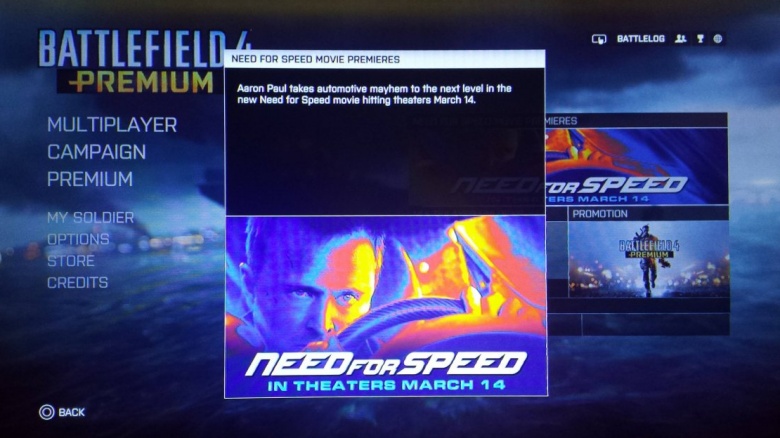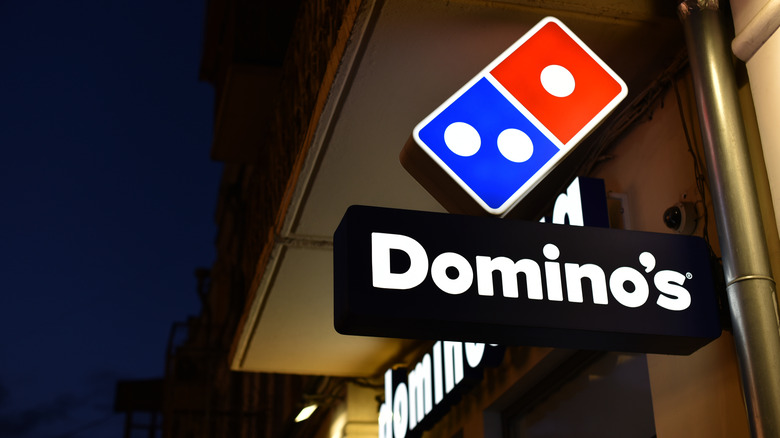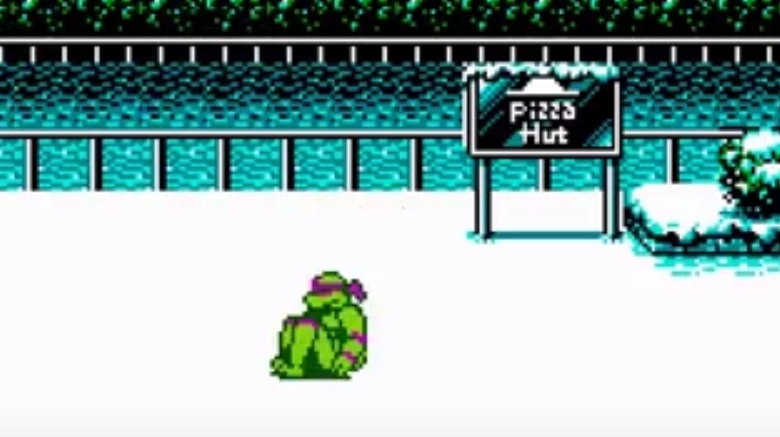The Worst Product Placements In Video Game History
Even after you've bought a video game, there's a good chance that it'll still try to upsell you on something, whether it's a season pass or a pizza delivered straight to your door. While product placement in games isn't a new phenomenon, it gets a little more invasive every day. We're not talking about fun entertainment franchise tie-ins, like DuckTales or Star Wars: Battlefront, but rather games that go out of their way to entice you to buy a product. Here are a few of the weirdest and worst product placements in video game history.
Battlefield 4 (2013)
Your average sports spectacle is full of ads for everything from cars to little blue pills, so playing a realistic sports video game without being bombarded by billboards and sideline advertising might seem kind of empty. So, when EA Sports games display dynamic promotional materials out on the field, it just blends right in. However, in-game advertising took on a whole new meaning when EA began to run ads for the film Need for Speed during the menu screens of the already problem-plagued Battlefield 4 ... just a year after Consumerist voted EA the worst company in America. Gamers were livid about EA's priorities, and haven't let them forget the blunder.
Darkened Skye (2002)
You'd never be able to tell from its cover, but the game Darkened Skye is all about doing fantasy-world magic with Skittles ... but that's how they get you. Gamers were initially lured in with the promise of a bosomy warrior girl, but once you start up your quest, your Skittle-meter becomes the center of your attention. Mars, Inc. had no problem with the deceptive premise, but for some reason, refused to allow any villainous snakes in the game, according to CGOnline. Snake-like villains, absolutely ... just no snakes. The game scored lukewarm reviews, despite the incredibly goofy product placement.
Sneak King (2006)
The awfully creepy Sneak King was only one in a trilogy of games starring Burger King's eerie, plastic-headed mascot, The King. PocketBike Racer and Big Bumpin', in a weird double-cross-promotion with the once-relevant Brooke Burke, are fairly standard racing and bumper car games. Sneak King, however, is a stealth-styled game in which The King must sneak up behind people and surprise them with Value Meals. Burke was left out of this stealth title, presumably because Burger King didn't want to promote the idea of beef-stalking Burke in her real-life cul-de-sac. Meatcreeping is questionable as a fictional video game activity ... but it's even worse in real life.
M.C. Kids (1992)
Of course, meat patty magnate McDonald's did it first. Back in 1992, Virgin Interactive published a game based on the storybook McDonaldland universe, wherein a couple of kids have to reclaim Ronald's stuff from the Hamburglar yet again, because McDonaldland jail bars are apparently just soggy french fries. In a truly Vader-esque twist, the game's final showdown happens inside a volcano, where you have to fight Ronald's magic bag of tricks, which has suddenly revealed that it is eeeeeeevilllll. We're not saying that George Lucas stole Revenge of the Sith from M.C. Kids, but even this fast food-based frolic got better reviews than the Prequel Trilogy.
Yo! Noid (1990)
If you were a kid in the '90s, Domino's anti-mascot The Noid was unavoidable, frequently trying to destroy our fresh delivery pizzas just for the heck of it. The Noid stopped being used in ads in 1989, when a mentally ill man named Kenneth Noid became irate about the use of his name and actually held Domino's employees hostage, but Yo! Noid came out the following year anyhow.
In this sidescroller, you play the heroic rubbery rabbit-type-thing, equipped with a deadly yo-yo as you save the city from evil creatures. At the end of every other level, you engage in a math-puzzle pizza-eating contest against an evil Noid, helping him gorge on truly ungodly amounts of dough and cheese. While it didn't entertain us in the least, we'll be damned if it didn't at least make us hungry.
Teenage Mutant Ninja Turtles II: The Arcade Game (1989)
Domino's wasn't the only pizza merchant to weasel their way into your Nintendo. A year before Yo! Noid was released, players could find Pizza Hut billboards scattered throughout almost all of TMNT II: The Arcade Game. While a few billboards on the sides of buildings made sense, it was the absolutely random, off-brand signage found around the game's icy park level that really stood out as excessive. While the use of pizza as power-ups makes perfect sense in Turtle-world, branded pizza just felt cheap. Yet tasty.
Chester Cheetah: Too Cool to Fool (1992)
Despite scientific findings that clearly state otherwise, Chester Cheetah's 1992 adventure maintains that one can, in fact, reach a level of cool where one can no longer be effectively fooled. As the mascot for dangerous-but-delicious snack food Cheetos, Chester's overly simple sidescrolling adventures weren't appreciated by many, and the game's graphics were about five years out of date. Of course, Chester's life bar was measured in paw-shaped Cheetos, and the more you had, the better ... which is the exact opposite of real life.
Pesterminator: The Western Exterminator (1990)
It's hard to tell if Pesterminator was a success in video game product placement. On one hand, a relatively small number of people would have ever heard of the Western Exterminator Company were it not for this off-brand, barely-known-anyhow NES game. On the other, even awareness of this awful game doesn't inspire much faith in exterminators operating out of Nevada, Arizona, and California. Ultimately, the rat-smashing Kernel Kleanup made a wimpy debut, but with his parent exterminator company still going strong almost 30 years later, it's clear that no companies were harmed in the making of this game.
Zool (1992)
In the ultimate goulash of things that make no sense, Zool is a ninja who landed on a planet made entirely of Chupa Chups-brand candy confections. Whether this is because of Chupa-factory explosion, a Chupa-world takeover, or just some other kind of Chupa-calypse is never answered. Another product-placement game with mediocre reviews, Zool escaped a far, far crueler fate when it was renamed from its original title: Pootz. It would've been very, very hard for Chupa Chups to explain away their food-based video game being named after flatulence.
Spot (1990)
There was a time when anything + sunglasses and limbs = mascot, even a lowly red dot. Thus was born 7-Up's laziest mascot: Spot. Not only is Spot for the NES a terrible ripoff of Othello, with obnoxious audio and extremely limited gameplay, but it actively made anyone who played the game hate 7-Up. The game had nothing to do with soft drinks, or enjoyment of any kind, but was still followed up by two more marginally superior 7-Up games: Cool Spot and Spot Goes to Hollywood. Still, the crimson disc wasn't doing anyone any favors, and his original game was an absolute bust.
James Pond 2: Robocod (1991)
James Pond 2 has the dubious pleasure of being one of the first video games to blatantly advertise a product with no subtlety whatsoever, proclaiming Penguin Biscuits to be "one of the chocolatiest biscuits in the world," and often forcing the fish-out-of-water hero to maneuver around the biscuits as obstacles. The blatant ad cutscenes were limited to the U.K. release, though, where the biscuits were actually sold. U.S. players simply had to suffer through weird boxes with skiing penguins on them. Oh, and a terrible game, too.



